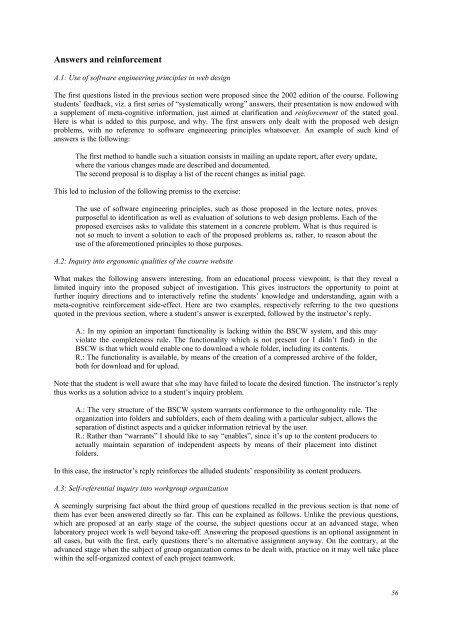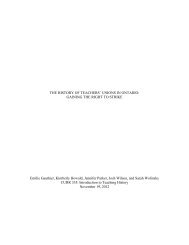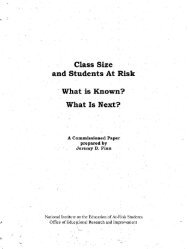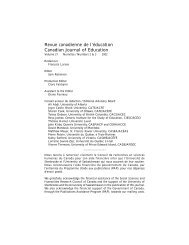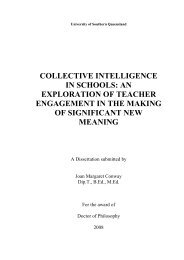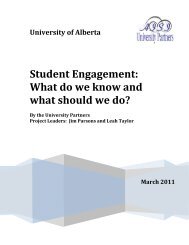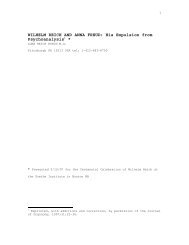October 2006 Volume 9 Number 4
October 2006 Volume 9 Number 4
October 2006 Volume 9 Number 4
You also want an ePaper? Increase the reach of your titles
YUMPU automatically turns print PDFs into web optimized ePapers that Google loves.
Answers and reinforcement<br />
A.1: Use of software engineering principles in web design<br />
The first questions listed in the previous section were proposed since the 2002 edition of the course. Following<br />
students’ feedback, viz. a first series of “systematically wrong” answers, their presentation is now endowed with<br />
a supplement of meta-cognitive information, just aimed at clarification and reinforcement of the stated goal.<br />
Here is what is added to this purpose, and why. The first answers only dealt with the proposed web design<br />
problems, with no reference to software engineeering principles whatsoever. An example of such kind of<br />
answers is the following:<br />
The first method to handle such a situation consists in mailing an update report, after every update,<br />
where the various changes made are described and documented.<br />
The second proposal is to display a list of the recent changes as initial page.<br />
This led to inclusion of the following premiss to the exercise:<br />
The use of software engineering principles, such as those proposed in the lecture notes, proves<br />
purposeful to identification as well as evaluation of solutions to web design problems. Each of the<br />
proposed exercises asks to validate this statement in a concrete problem. What is thus required is<br />
not so much to invent a solution to each of the proposed problems as, rather, to reason about the<br />
use of the aforementioned principles to those purposes.<br />
A.2: Inquiry into ergonomic qualities of the course website<br />
What makes the following answers interesting, from an educational process viewpoint, is that they reveal a<br />
limited inquiry into the proposed subject of investigation. This gives instructors the opportunity to point at<br />
further inquiry directions and to interactively refine the students’ knowledge and understanding, again with a<br />
meta-cognitive reinforcement side-effect. Here are two examples, respectively referring to the two questions<br />
quoted in the previous section, where a student’s answer is excerpted, followed by the instructor’s reply.<br />
A.: In my opinion an important functionality is lacking within the BSCW system, and this may<br />
violate the completeness rule. The functionality which is not present (or I didn’t find) in the<br />
BSCW is that which would enable one to download a whole folder, including its contents.<br />
R.: The functionality is available, by means of the creation of a compressed archive of the folder,<br />
both for download and for upload.<br />
Note that the student is well aware that s/he may have failed to locate the desired function. The instructor’s reply<br />
thus works as a solution advice to a student’s inquiry problem.<br />
A.: The very structure of the BSCW system warrants conformance to the orthogonality rule. The<br />
organization into folders and subfolders, each of them dealing with a particular subject, allows the<br />
separation of distinct aspects and a quicker information retrieval by the user.<br />
R.: Rather than “warrants” I should like to say “enables”, since it’s up to the content producers to<br />
actually maintain separation of independent aspects by means of their placement into distinct<br />
folders.<br />
In this case, the instructor’s reply reinforces the alluded students’ responsibility as content producers.<br />
A.3: Self-referential inquiry into workgroup organization<br />
A seemingly surprising fact about the third group of questions recalled in the previous section is that none of<br />
them has ever been answered directly so far. This can be explained as follows. Unlike the previous questions,<br />
which are proposed at an early stage of the course, the subject questions occur at an advanced stage, when<br />
laboratory project work is well beyond take-off. Answering the proposed questions is an optional assignment in<br />
all cases, but with the first, early questions there’s no alternative assignment anyway. On the contrary, at the<br />
advanced stage when the subject of group organization comes to be dealt with, practice on it may well take place<br />
within the self-organized context of each project teamwork.<br />
56


